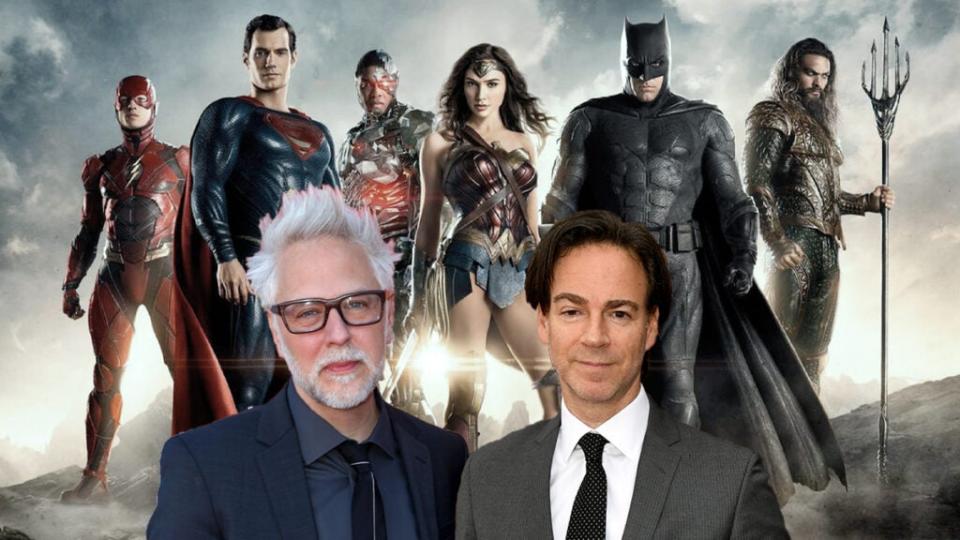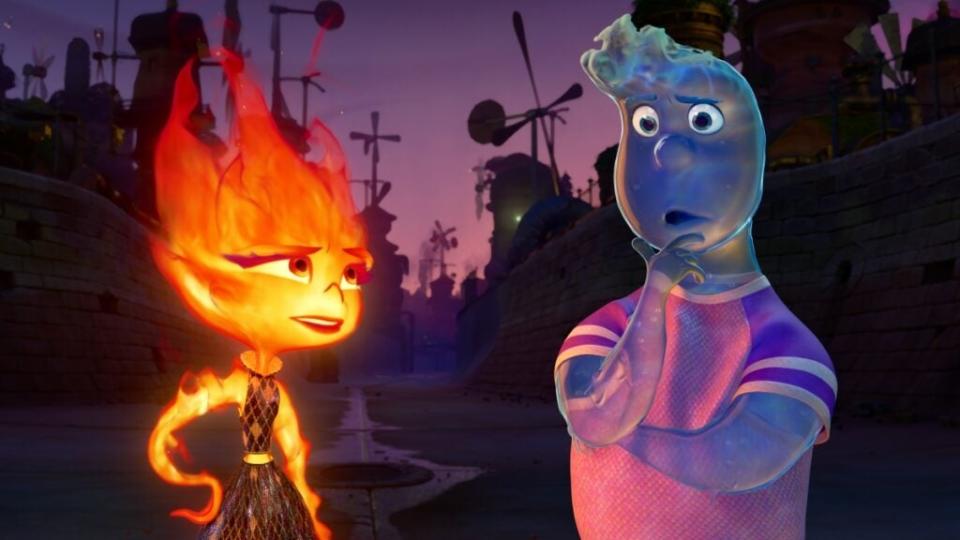‘The Flash’ and ‘Elemental’ Flops Send Red Alerts for 2 of Hollywood’s Biggest Box Office Brands | Analysis

- Oops!Something went wrong.Please try again later.
- Oops!Something went wrong.Please try again later.
- Oops!Something went wrong.Please try again later.
Pixar and DC are supposed to be the crown jewels for Disney and Warner Bros., respectively. But the dismal opening weekends for DC’s “The Flash” and Pixar’s “Elemental” have continued the recent slumps for these two brands – and it’s time to call a red alert.
Whether that red alert is for the box office in general or these two titanic brands in particular is something Hollywood is likely to be debating intensively in the coming days and weeks. “Elemental’s” poor opening comes on the heels of underperformer “Lightyear” in 2022 and the Disney+ titles “Turning Red” in 2022, “Luca” in 2021 and “Soul” in 2020, which had poor international box office amidst the COVID-19 pandemic. And DC is suffering new pain after the underperformance of “Black Adam” in late 2022 and “Shazam!: Fury of the Gods” earlier this year.
“Brands can only get you so far. It’s about the movies themselves, and they have to deliver” said Comscore analyst Paul Dergarabedian. “Audiences these days are very savvy and discerning, and in today’s world only the films that have an overwhelmingly positive critical and/or audience response are the ones that break through at the box office.”
Also Read:
‘The Flash’ Crashes With $55 Million Box Office Opening; ‘Elemental’ Bombs With $29.5 Million Start
By failing to clear that higher bar, “Flash” and “Elemental” have triggered a wave of large-scale questions that two of Hollywood’s top studios must face: What are the implications for the Pixar hit machine that drives so much of Disney’s global business? And what are the implications for Warner Bros. Discovery CEO David Zaslav’s plan to rebuild the superhero business under the DC brand? Does this suggest that the theatrical business cannot recover post-COVID?
Dergarabedian noted that there are no easy answers to those questions, but feels confident that Pixar and DC are not stuck in a hole so deep that one big hit can’t get them out of, whether that hit is a future Pixar film with a premise that hooks a larger number of moviegoers or a successful reboot by DC with “Superman: Legacy,” which is currently casting ahead of a release in summer 2025.
“Look at what happened with Fox and the ‘X-Men’ movies, which for years were doing poorly with audiences until they released ‘Logan,’ which was a big box office hit,” he said. “Having a poor reputation with moviegoers because of past films may make marketing harder, but audiences have shown they’re willing to listen to strong word of mouth.”
Also Read:
‘The Flash’ Review: A Vague, Confusing Trip to the Multiverse
Since its first trailer was released on Super Bowl weekend to strong social media reception, “The Flash” was expected to do better at the box office than the $140 million global opening weekend of the Dwayne Johnson-fronted “Black Adam.” Instead, it crashed to a $55 million domestic and a $139 million global three-day opening, earning a B from CinemaScore audience polls.
Considering that “Black Adam” earned a B+ from CinemaScore yet fell sharply in its second weekend, “The Flash” is now in a position where it could very well fail to even match the lackluster $393 million global total of “Black Adam” while carrying a $200 million-plus budget before marketing costs, with both films joining this past spring’s “Shazam!: Fury of the Gods” among the recent streak of DC flops.
“Elemental” also carries a $200 million budget — as is customary for Pixar films — and it’s doing even worse, with a $29.5 million domestic opening weekend. “Elemental” was never expected to do well at the box office with opening projections topping out at $40 million, but this is now the worst start in Pixar history after inflation adjustment.
While theaters aren’t necessarily suffering right now given the plethora of movies they have to screen, including the Sony hit “Spider-Man: Across the Spider-Verse,” Pixar and DC stood prior to the pandemic as some of the film industry’s most reliable producers of tentpole hits. A market in which they return to that high performance standard is one with a much better chance of seeing theatrical grosses return to pre-COVID levels.
But it’s clear from “The Flash” and “Elemental” that these franchises and the studios that produced them are not resonating with audiences the way they once did, and there are plenty of hard lessons to be learned about why these films struggled and where Pixar and DC go from here.

Yes, Ezra Miller was a factor
Having the lead actor of your big budget superhero film get into a series of violent and erratic run-ins with the law after production is completed is a studio’s nightmare. And while Warner Bros. tried to work around the multiple arrests of “The Flash” star Ezra Miller, it proved to be too much to overcome.
Miller’s behavior certainly soured the social media buzz surrounding “The Flash” in the weeks leading up to release, but the vast majority of moviegoers don’t engage in such discussions. The scandals, however, have other effects outside the Internet, as Warner Bros. decided to not make Miller available to the media. Consequently, the actor only appeared at the film’s premiere and made a brief speech to the attendees.
Having the lead star go on a big media tour to support a tentpole film doesn’t ensure box office success — just look at how “Black Adam” did despite Dwayne Johnson promoting it with all his might — but such an absence can be a huge hurdle. This is especially the case for comic-book films as studios need to get audiences to embrace the pairing they have made of actor and superhero to ensure long-term franchise potential.
With scandals sidelining Miller and their legendary costar Michael Keaton skipping the premiere and press tour to continue shooting a sequel to “Beetlejuice” for Warner Bros. in London, “The Flash” didn’t have its two biggest stars to promote it. While director Andy Muschietti and co-star Sasha Calle, who plays Supergirl, carried on in their absence, that marketing hurdle was too much to overcome.
Also Read:
Ezra Miller Praises ‘The Flash’ Director in First Public Appearance Since Legal Troubles
Pixar films are no longer theatrical events
Eight years ago, “Inside Out” hit theaters right after “Jurassic World,” a film that would become Universal’s highest-grossing film ever. Despite that stiff competition and not having the advantage of a preexisting franchise, “Inside Out” opened to $90.4 million and grossed $857 million worldwide. The director of that film, three-time Oscar winner Pete Docter, is now the creative chief of Pixar.
But Docter, along with the theatrical team at Disney, has a significant challenge on his hands, as the Pixar name is no longer enough to sell tickets on its own as “Elemental” has now handed the studio its second straight midsummer flop. It joins last June’s “Toy Story” spin-off “Lightyear,” whose director Angus MacLane and producer Galyn Susman were among the 75 Pixar employees recently laid off.
Disney gave “Elemental” a full marketing campaign and a premiere at the Cannes Film Festival, doing everything it could to sell the film as one that must be seen on the big screen and preferably with 3D glasses. But the story of a sweethearted water creature named Wade and a hot-tempered fire being named Ember falling in love in a city full of element beings failed to intrigue would-be moviegoers, as the pre-release social media buzz dismissed the film as too similar to the Disney animated movie “Zootopia” to be interesting.

The DC brand is toxic and James Gunn has work to do
When “Shazam!: Fury of the Gods” flopped this past spring, its poor numbers were chalked up in part to its tepid reviews; but both Warner Bros. insiders and analysts who spoke to TheWrap pointed to the recent news that new DC Studios chiefs James Gunn and Peter Safran were rebooting the DC universe as another factor.
With recent films like “Wonder Woman 1984” getting poor reception and the end of the cinematic universe where films like “Shazam 2” resided, the hook that most contemporary superhero films have by teasing setups for future sequels and a larger, interconnected plot is no longer there for DC. With its timeline-bending story and its references to past movies from Tim Burton’s “Batman” to “Man of Steel,” there was hope that “The Flash” could still draw interest from DC fans curious to see what surprise cameos and potential reboot setups were in store.
Instead, the plummeting fortunes of “The Flash” and its tepid CinemaScore grade have shown that audiences no longer trust DC movies as we know them today to deliver quality. While the Marvel Cinematic Universe has lost some fan approval in the last year or so and hasn’t avoided posting a recent flop itself, the recent success of “Guardians of the Galaxy Vol. 3” has shown that it can still yield a big hit.
The DC Extended Universe has had no saving grace, as the sole post-COVID DC hit has been “The Batman,” a film set in its own timeline and whose sequel will be separate from the new universe that Gunn will launch with “Superman: Legacy” in 2025. Whether moviegoers will be willing to give the “Guardians of the Galaxy” director’s new vision a chance remains to be seen.
Also Read:
‘Asteroid City’ Lights Up Specialty Box Office With Best Theater Average Since 2016
Pixar’s budget model may be unsustainable
While some creative Hollywood accounting may be afoot, many of the Hollywood studios’ animation divisions — from Illumination and DreamWorks at Universal to Sony Pictures Animation and Paramount’s Nickelodeon — produce their films at budgets between $70-$90 million. Illumination’s massive hit “The Super Mario Bros. Movie” was produced on a $100 million budget, a price tag that is unusually high for Chris Meledandri’s animation house.
But Pixar and Walt Disney Animation regularly produce films at double that amount, with “Lightyear” and “Elemental” both carrying $200 million budgets according to insiders. For Pixar, big budget animation has been a successful model for years, investing in new software to advance the visuals of its computer animation. Combined with stories cultivated by former Pixar chief John Lasseter, the studio yielded big hits from “Finding Nemo” in the early 2000s to “Coco” and “Incredibles 2” in the late 2010s.
But recent animated hits like “Mario” and “Spider-Man: Across the Spider-Verse” have wowed audiences with their visuals, taking away the edge Pixar once had. With Walt Disney Animation Studios’ upcoming Thanksgiving animated movie “Wish” also with a $200 million budget and Pixar’s 2024 original film “Elio” likely to do the same, both of Disney’s animation houses may have to face the prospect of belt-tightening if these films continue to struggle theatrically, even given Disney’s ability to turn their films into fountains of merchandising revenue.

DC’s nightmare year may get worse
If audiences have abandoned DC until Gunn’s reboot plans hit the big screen, then the two remaining superhero movies Warner Bros. has to release this year may be in just as much trouble as “The Flash.”
In August, the DC film “Blue Beetle” will hit theaters looking to draw Latino audiences to see Xolo Maridueña play Jaime Reyes, with the particular hope that Mexican audiences will turn out in a way that they didn’t for “In the Heights.” But with a reported $120 million budget, “Blue Beetle” needs to succeed across demographics, and the poor public image DC has right now may poison that.
The same may also happen with “Aquaman and the Lost Kingdom,” which is coming out during the holiday season alongside two other Warner Bros. films, “Wonka” and “The Color Purple.” While the best case scenario is that those films cater to the interests of very different audiences and find a way to coexist, the Jason Momoa-fronted “Aquaman 2” is supposed to be the big four-quadrant play, and the conversation around that release may be more about DC’s bad track record and the offscreen troubles of the film’s co-star Amber Heard rather than anything that actually happens in the film.
Pixar’s problem may be larger than just one studio
While some may attribute Pixar’s problems to the quality of their recent films, the audience reception of “Elemental” doesn’t bear that out. “Elemental” earned an A on CinemaScore and has an audience Rotten Tomatoes score of 91%. Several of Pixar’s COVID-era films developed under Pete Docter, including “Soul,” “Luca” and “Turning Red,” have also earned strong reviews from critics and audiences despite being moved to streaming release.
So the problem isn’t necessarily word of mouth, but more how Disney and Pixar sell these original films in a world where audiences don’t immediately buy a ticket the moment they see that logo with the hopping desk lamp. Unfortunately, there’s no recent original successes that Disney can learn from. The last animated movie that was not a sequel or based on pre-existing IP to gross over $500 million worldwide is Pixar’s “Coco” back in 2017.
Also Read:
‘Elemental’ Is an Immigrant Tale, but It Also Cuts Deep as a Story About Disability (Commentary)
Since theaters reopened, the big animated hits have been sequels to “Minions,” “Puss in Boots,” and “Spider-Man: Into the Spider-Verse,” as well as “Mario,” a movie about the most famous video game character ever. Disney’s “Encanto” might have been that big post-shutdown original hit, but the COVID-19 Omicron variant that arrived in November 2021 kept families at home, where they quickly embraced the film when it hit Disney+ at Christmas.
And the toughest part is that the next big original animated movie doesn’t come until the holidays, with Disney’s “Wish” arriving on Thanksgiving. After that, Illumination will test their growing popularity with an original film of their own: “Migration,” a movie about a family of ducks flying south for the winter written by “The White Lotus” creator Mike White.
If “Migration” can leg out and become a big holiday hit, Illumination may end up showing the rest of Hollywood, including Pixar, just what sort of original movies families and general audiences are interested in, and further cement the belief that it has supplanted Pixar as the top animation studio in town.
Also Read:
‘Avatar’ Delay Pushes Disney Film Schedule – and Can Make or Break Bob Iger’s Legacy | Analysis

